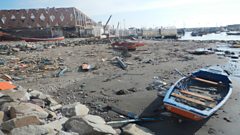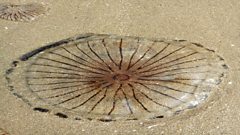Anaesthesia; Chilean earthquakes; Strange weather; Jellyfish
The news in science and science in the news. Dr Adam Rutherford discovers if quantum physics holds the answer to the long-held mystery of how our common anaesthetics work.
Anaesthetics.
General anaesthetic is an essential part of modern medicine. Millions of surgical procedures, many life-saving, simply could not be performed without rendering the patient unconscious with one of a long list of drugs that induce anaesthesia. But, we don't know how they work.
Part of this mystery is because we're not entirely sure what we mean when we say unconscious. But part of it is that there's a whole fleet of different molecules than can work as an anaesthetic, so there's no well-known pathway we can study. Neuroscientist, Luca Turin at the Alexander Fleming Research Center in Greece thinks that the answer to how they work, could lie, not at the chemical level, but at the quantum level.
2014 Iquique Earthquake in Chile
Before the massive 8.1-8.2 Magnitude earthquake struck Iquique in Chile, in April, this year, there were a series foreshocks at the fault line. Adam Rutherford asks Roland Pease if these creaks could be a way of warning us about an imminent big quake in the future. They also discuss whether the stress released by the megathrust quake means the region will be seismically inactive for a while. The experts think not.
Strange Weather
We are obsessed with the weather. It is a powerful, shared daily experience, offering us an immediate talking point. Yet when we talk about climate change the sense of guilt or powerlessness can often be enough to kill the conversation. A new exhibition at Science Gallery at Trinity College Dublin aims to engage conversations about both weather and climate in a playful, provocative way. By bringing together works by artists, designers, scientists, meteorologists and engineers STRANGE WEATHER asks questions such as: Should human culture be reshaped to fit strange weather or should we reshape weather to fit our strange culture? Who is going to take advantage of climate chaos and how will strange weather benefit me? How will you choose to work, celebrate, live and die when weather gets weird?
Strange Weather runs at Science Gallery, Trinity College Dublin from 18th July to 5th October 2014
Neutrinos
A listener writes in to ask if we will ever run out of room in our Universe for the trillions and trillions of neutrinos being created. Malcolm Fairbairn at Kings College London does the maths.
Jellyfish
Last year was a record for jellyfish sightings off the UK coast. We know very little about our jellyfish, and experts at the Marine Conservation Society want to know more. They're set up a survey, complete with photographic guides and reporting forms for you to send in your sightings of these coastal visitors.
Producer: Fiona Roberts.
Last on
Broadcasts
- Thu 14 Aug 2014 16:3091热爆 Radio 4
- Thu 14 Aug 2014 21:0091热爆 Radio 4
Explore further with The Open University
Discover more fascinating science content with The Open University
Podcast
-
![]()
91热爆 Inside Science
A weekly programme looking at the science that's changing our world.




